

JRR Tolkien's Beowulf translation to be published. 20 March 2014Last updated at 06:19 ET JRR Tolkien's translation of Beowulf will be published in May A translation of the Old English poem Beowulf by author JRR Tolkien is to be published for the first time, nearly nine decades after it was completed.

The Lord Of The Rings author's estate has signed a deal with HarperCollins to release it as a book in May. The new work Beowulf: A Translation And Commentary has been edited by his son Christopher Tolkien. The Seagull. Though the character of Trigorin is considered Chekhov's greatest male role, like Chekhov's other full-length plays, The Seagull relies upon an ensemble cast of diverse, fully developed characters.
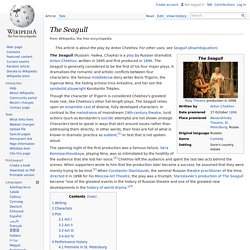
In contrast to the melodrama of mainstream 19th-century theatre, lurid actions (such as Konstantin's suicide attempts) are not shown onstage. Characters tend to speak in ways that skirt around issues rather than addressing them directly; in other words, their lines are full of what is known in dramatic practice as subtext,[1] or text that is not spoken aloud. The Cherry Orchard. The Cherry Orchard (Вишнëвый сад or Vishnevyi sad in Russian) is the last play by Russian playwright Anton Chekhov.
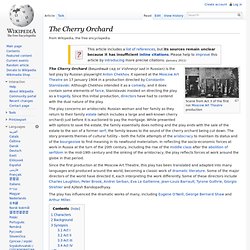
It opened at the Moscow Art Theatre on 17 January 1904 in a production directed by Constantin Stanislavski. Although Chekhov intended it as a comedy, and it does contain some elements of farce, Stanislavski insisted on directing the play as a tragedy. Three Sisters (play) Chekhov in a 1905 illustration.
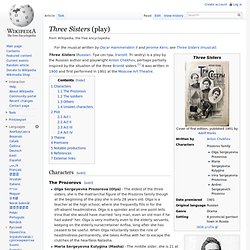
Three Sisters (Russian: Три сeстры, translit. Uncle Vanya. Anton Chekhov. Anton Pavlovich Chekhov (Russian: Анто́н Па́влович Че́хов, pronounced [ɐnˈton ˈpavləvʲɪt͡ɕ ˈt͡ɕexəf]; 29 January 1860[1] – 15 July 1904)[2] was a Russian physician, dramaturge and author who is considered to be among the greatest writers of short stories in history.[3] His career as a dramatist produced four classics and his best short stories are held in high esteem by writers and critics.[4][5] Chekhov practised as a medical doctor throughout most of his literary career: "Medicine is my lawful wife", he once said, "and literature is my mistress.
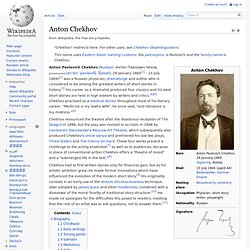
Les Précieuses ridicules. Les Précieuses ridicules (French pronunciation: [le pʁesjøz ʁidikyl], The Ridiculous Précieuses or The Affected Ladies) is a one-act satire by Molière in prose.
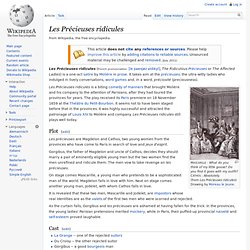
It takes aim at the précieuses, the ultra-witty ladies who indulged in lively conversations, word games and, in a word, préciosité (preciousness). MASCARILLE : What do you think of my little goose? Do you find it goes with my outfit? CATHOS : Absolutely. (from Les Précieuses ridicules) Drawing by Moreau le Jeune. Les Précieuses ridicules is a biting comedy of manners that brought Molière and his company to the attention of Parisians, after they had toured the provinces for years. Plot[edit] Les précieuses are Magdelon and Cathos, two young women from the provinces who have come to Paris in search of love and jeux d'esprit. Le Bourgeois gentilhomme. Le Bourgeois gentilhomme Frontispiece and titlepage of "Le Bourgeois gentilhomme" from a 1688 edition.
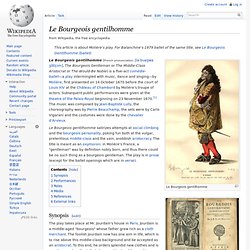
Synopsis[edit] The Imaginary Invalid. Molière had fallen out with the powerful court composer Jean-Baptiste Lully, with whom he had pioneered the comédie-ballet form a decade earlier, and had opted for the collaboration with Charpentier, Lully's rival and arguably a more gifted composer.
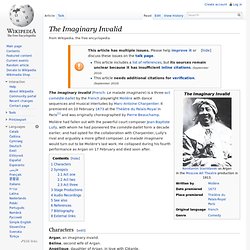
Le malade imaginaire would turn out to be Molière's last work. He collapsed during his fourth performance as Argan on 17 February and died soon after. Characters[edit] Argan, an imaginary invalid.Béline, second wife of Argan.Angélique, daughter of Argan, in love with Cléante.Louison, Argan's young daughter, sister of Angélique.Béralde, brother of Argan.Cléante, lover of Angélique.Mr. Diafoirus, a physician.Thomas Diafoirus, his son, in love with Angélique.Mr. The Miser. The School for Wives. Front page of L'École des femmes—engraving from the 1719 edition Characters and scene[edit]
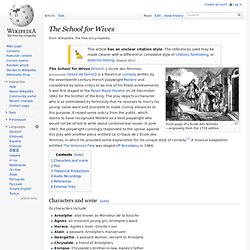
Tartuffe. History[edit] Molière wrote Tartuffe in 1664.
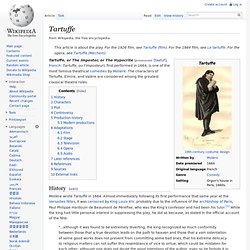
Almost immediately following its first performance that same year at the Versailles fêtes, it was censored by King Louis XIV, probably due to the influence of the archbishop of Paris, Paul Philippe Hardouin de Beaumont de Péréfixe, who was the King's confessor and had been his tutor.[1] While the king had little personal interest in suppressing the play, he did so because, as stated in the official account of the fête: As a result of Molière's play, contemporary French and English both use the word "tartuffe" to designate a hypocrite who ostensibly and exaggeratedly feigns virtue, especially religious virtue.
The Misanthrope. The play satirizes the hypocrisies of French aristocratic society, but it also engages a more serious tone when pointing out the flaws which all humans possess. The play differs from other farces at the time by employing dynamic characters like Alceste and Célimène as opposed to the traditionally flat characters used by most satirists to criticize problems in society. It also differs from most of Molière's other works by focusing more on character development and nuances than on plot progression.